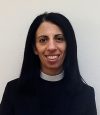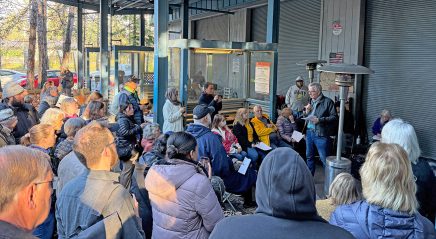“Even though I walk through the darkest valley, I fear no evil, for you are with me; your rod and your staff, they comfort me” (Psalm 23:4).
Cancer often feels like walking through that valley—the shadow long, the fear real and the weight unbearable. A Palestinian woman now living in Wisconsin, I have not fought cancer myself, but I have felt its sting: I lost my younger sister to cancer in 2010, and my father in 2020. When cancer returned in 2024—this time striking my youngest brother, Odeh—I found myself wondering: How long can one family endure?
Odeh was just 38 when he was diagnosed with lung cancer. At that time, the war on Gaza was escalating. While we were grieving the loss of five members of my extended family in Gaza, we also began our fight against cancer in Bethlehem.
The war has caused widespread job losses for Palestinians in Bethlehem. Odeh, too, had to leave his position, as an accountant for the Catholic Diocese in nearby Jerusalem, to begin chemotherapy at a hospital in Ramallah. Because he could not endure both the physical demands of treatment and the stress of commuting from Bethlehem to Ramallah, his health deteriorated rapidly. We desperately hoped to transfer him to Augusta Victoria Hospital (AVH) in East Jerusalem—the premier cancer treatment center in the West Bank and Gaza, operated by the Lutheran World Federation (LWF).
But we faced seemingly impossible obstacles. The Palestinian Authority was overwhelmed, and public attention and funding were focused elsewhere. We needed a significant amount of money. My family felt abandoned. In desperation, I reached out to my bishop, Anne Edison-Albright of the East Central Synod of Wisconsin. Without hesitation, she responded with compassion and resolve. Together we contacted Gabi Aelabouni, then ELCA desk director for the Middle East and North Africa, who lived in Jerusalem. Relying on strong relationships on the ground, Aelabouni, Bishop Sani Azar of the Evangelical Lutheran Church in Jordan and the Holy Land (ELCJHL) and the LWF office worked with AVH to coordinate Odeh’s admission.
This is accompaniment in action.
Accompaniment, as the ELCA understands it, means walking together in solidarity. It is rooted in mutuality, recognizing the dignity, humanity and gifts of all people as equal members of God’s household. Accompaniment does not promise solutions—only presence and faithfulness.
Free of charge, Odeh was admitted to AVH, where further testing revealed that his diagnosis had been incorrect. He suffered not from lung cancer but from a germ cell tumor. That explained why the initial chemotherapy had failed. He was given a new treatment plan.
His journey has been harrowing. Multiple surgeries. Physical and emotional agony. Several times, we thought we were losing him—but God revived him. After a brief remission, the cancer returned. He needed more treatment, and again we sought help.
By then, Aelabouni had returned to the United States with his wife, Meghan, who had been elected bishop of the Rocky Mountain Synod. Yet even from afar, he offered my family the ministry of accompaniment. The ELCA, the ELCJHL and the staff of AVH again partnered to admit Odeh to the hospital. This is what defines accompaniment: a steadfast presence that endures beyond isolated acts of help, offering light in the darkest valleys of people’s lives.
Every time my brother traveled to AVH, our mother accompanied him. Israel allows only one caregiver to escort each patient, and the journey from Bethlehem to Jerusalem is never easy. The military checkpoints are dehumanizing. My mother was unable to return home each night, so during each round of chemotherapy, she stayed with Odeh in Jerusalem for a week or more. The staff at AVH—especially the social services team—offered her extraordinary support and care.
This journey has been physically draining and emotionally overwhelming. Yet in the darkness, we saw the light of Christ shining through Edison-Albright, Aelabouni, Azar, the AVH staff and my parish, St. Mark Lutheran Church in Neenah, Wis. I preach accompaniment as theology; now I proclaim it as testimony. My family and I have lived it.
The ELCA’s ministry of accompaniment is not theoretical; it is real. People showed up to accompany my family in our deepest need and walked with us through the valley of the shadow of death. This ministry saved my brother’s life. It renewed our hope and reminded me that my family and I are not alone. No matter what happens to my brother or my country, I know that my church will stand with us. I am committed to the ministry of accompaniment for as long as God calls me to walk with others, just as others have faithfully walked with me.









